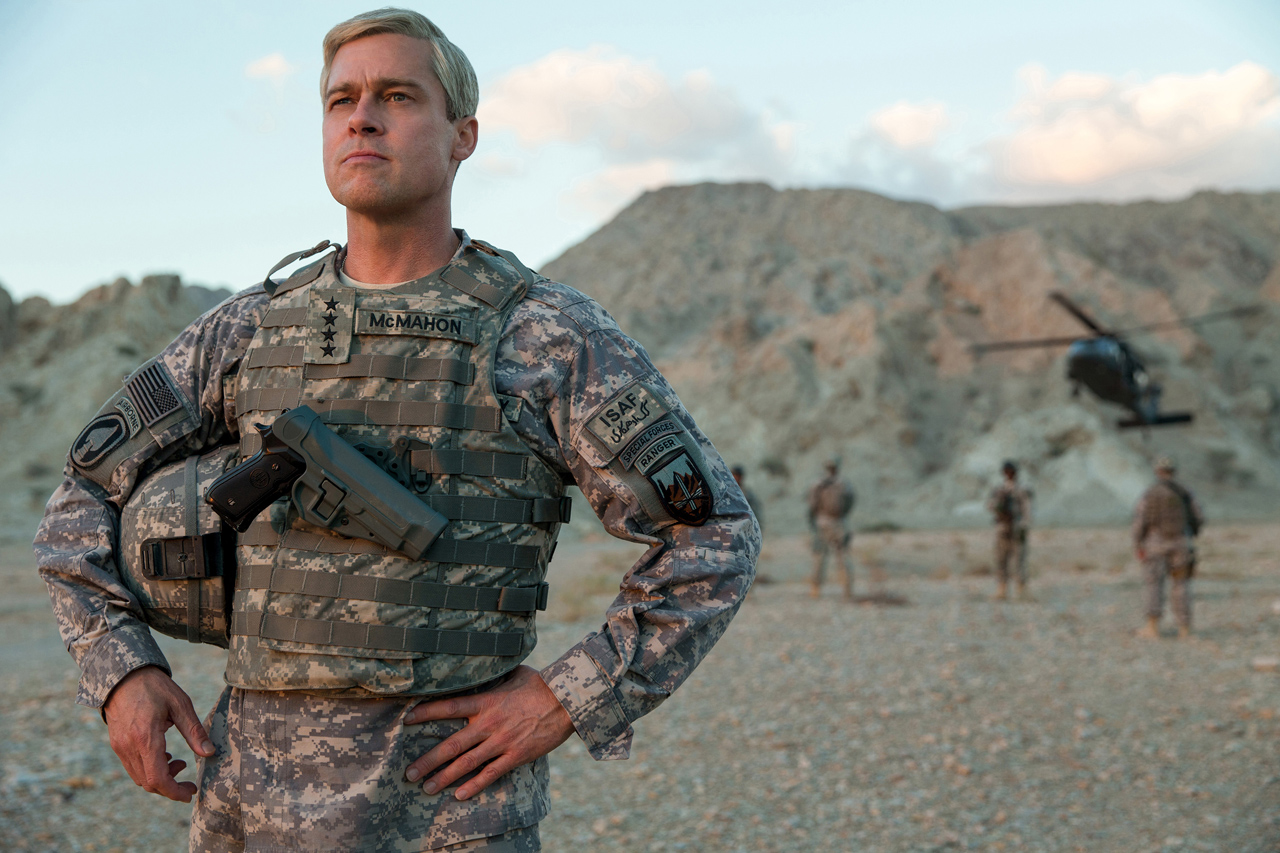Within War Machine is a great movie…somewhere. I could be wrong. Perhaps bureaucracy of war will never be as captivating or potent as a battle. Perhaps. But David Michod and Brad Pitt get pretty close to an incisive, transcendent story to talk about the machinations of winning the war on terror, but they can’t quite deliver. Feels like War Machine is actually wearing George W. Bush’s “Mission Accomplished” banner without really achieving anything significant.
General Glen McMahon (Brad Pitt, loosely playing Stanley McChrystal) at the start of War Machine is a decorated, respected war general who gets the lovely task of fixing the war in Afghanistan. McMahon swaggers into the job with his results driven team including his screamy 2nd Greg Pulver (Anthony Michael Hall), “Secretary” Willy Dunne (Emory Cohen), publicists Cory Staggart (John Magaro) and Matt Little (Topher Grace), and tech specialist Andy Moon (RJ Cyler). But when McMahon arrives in Afghanistan, he realizes how difficult it is to impose his management into the pun intended landmine ridden world of managing a war in a political and public arena. McMahon’s confidence and belief in what he is doing is slowly eroded from many sources and many places, including jaded corporals (Lakeith Stanfield), aloof Afghani President Karzai (Ben Kingsley), a journalist (Scoot McNairy), and “clearly not war torn” senator Pat McKinnon (Alan Ruck).
Michael Hastings book is ripe for a mondernizing of Dr. Strangelove, arguably the greatest satire of all time. War Machine sets its sights on that classic and briefly touches the greatness that the Peter Sellers film. When the satire gets specific, the laughs got louder (the biggest laugh for me was about what crops we can actually grow overseas). The political maneuvering is the most compelling part of that satire; watching a war hero “Hoo RAH!!!” marine clash with a whiny politician speaking useless platitudes, struggling to schedule a talk with the President about war strategy, and trying to spin news stories. It so doesn’t seem to fit McMahon’s comfort zone, and watching how the strategist navigates these issues is compelling, sometimes funny, and always engrossing. However, War Machine can’t help but feel very general in its incision when it should be identifying specific parts of the machine to ridicule. David Michod, the director, might have been chosen by Brad Pitt because of his outside perspective on our war chicanery (and you know, his generally good direction), but in general his presence might hinder the biting nature of some of the satire.
The non satire parts of the War Machine Michod does better with: the character study of General McMahon. It certainly helps that Pitt, talented thespian that he is, is playing the man. Pitt sells McMahon’s conviction and Marine bravado outwardly, but the actor also sells the general’s fascinating inner life. McMahon may look like a soldier cliché, but the guy is pretty good with the hopelessly complicated war bureaucracy. He knows how to push certain buttons better than people expect from him, like how he gets the president to agree to meet in person, effectively managing his entourage, and his team is mostly good at what they do! In addition, Pitt sells the slow evisceration of any ideals he held about the Afghan war, getting bested by “lesser” people with the moral highground. However, these dramatic elements never quite mesh with the satire the movie also is trying to do, as if the movie couldn’t decide between the two elements and just hoped it would work. Sometimes it does, and sometimes it doesn’t, surprisingly inefficient for a movie with machine in the title.
War Machine is imperfectly interesting. It aims for Kubrickian highs, but never quites out perfects the notorious perfectionist. How ironic the movie (perfect looking on paper, turmoil in the interior) perfectly mirrors the way its star is feeling right now. Here’s to leveling out Brad Pitt; I hope Netflix let’s you eventually recapture your inner Durden again someday.

